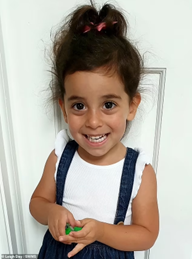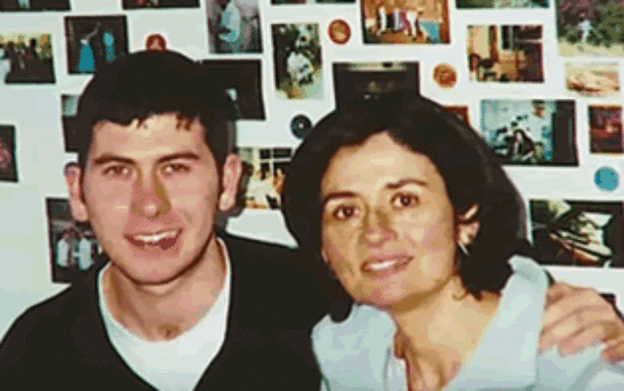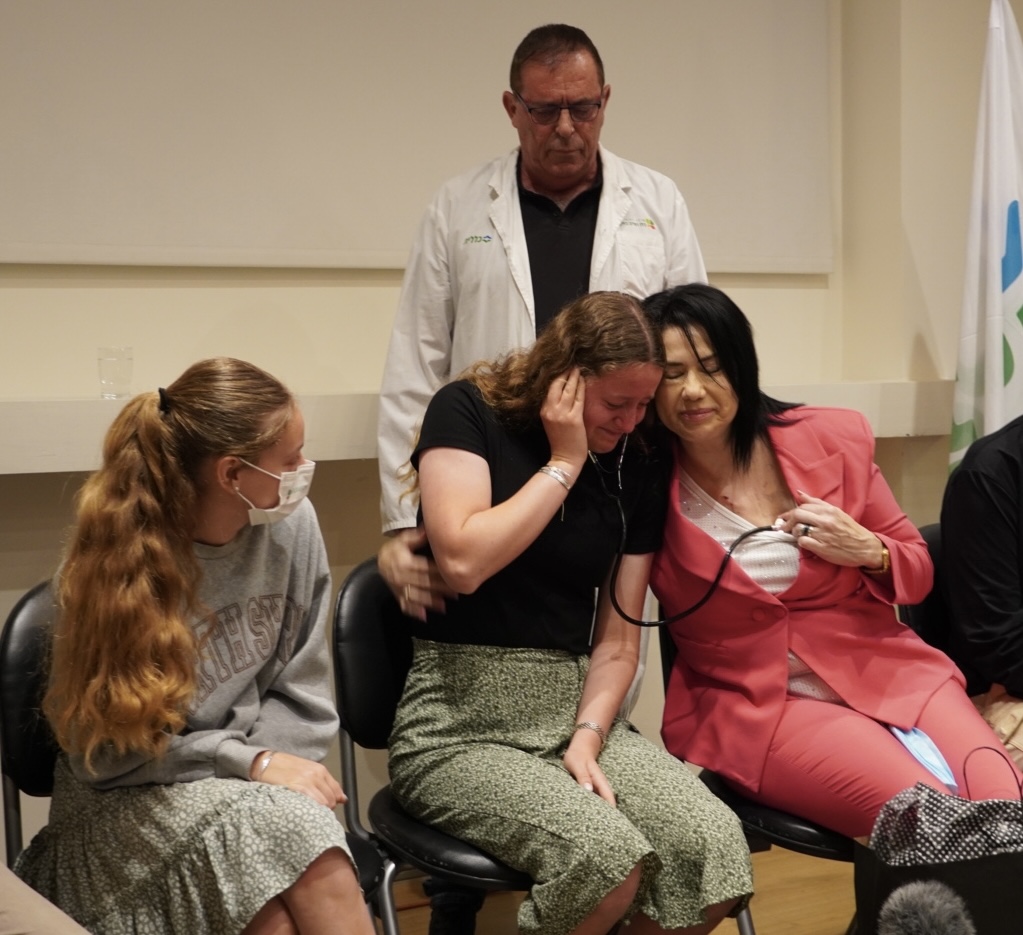Bereaved parents highlight life-saving opportunities of organ donation
Jewish Organ Donation Association brings together Sadie Salt's father and Yoni Jesner's mother to encourage families to have urgent conversation about donation this Jewish new year
The mother of the murdered Scottish teenager Yoni Jesner and father of the late two-year-old Sadie Salt have united in support of a campaign for the Jewish Organ Donation Association (JODA UK).
The organisation brought together together Adam Salt, father of two-year-old Sadie, who passed away after a choking on a piece of sausage at nursery in 2020, and Marsha Gladstone, mother of 19-year-old Yoni Jesner, who was killed in a suicide bombing on a bus in Tel Aviv, Israel in 2002.
Both families agreed to the donation of their loved ones’ organs to save the lives of several people. Sadie’s kidneys were donated to a man in his thirties, whilst Yoni’s organs saved the life of two Jewish men and a Palestinian girl, Yasmin, who Marsha later met.
Together, they have launched an emotive campaign encouraging Jewish people to speak to their family about their organ donation wishes, record their decision and ultimately increase the number of people whose lives can be saved or transformed by an organ transplant.
In a highly emotional first meeting, Marsha and Adam shared their experiences of losing their loved ones in tragic circumstances, their organ donation decision making process and the importance of families having essential conversations about their wishes around organ donation.
They also discussed Sadie and Yoni’s legacies, and the comfort of knowing that Sadie and Yoni’s organs helped save the lives of others.

In a tearful exchange, Adam presented Marsha with a gold organ donation badge. All families who agree to organ donation in England and Wales receive a heart-shaped badge with the word ‘Yes’, to acknowledge their decision and thank them for their role in honouring their loved one’s wishes.
Adam Salt, from St Albans, Hertfordshire said: “Connecting with Marsha about Yoni and Sadie’s lives and legacies was incredibly moving and we were able to share our thoughts, emotions and experiences.
“Yoni was just getting on a bus whilst Sadie was only going to nursery. It’s impossible to comprehend. But organ donation has given meaning and comfort to our families and we are proud that Sadie could save the lives of others.”
Marsha Gladstone said: “Meeting Adam was a very meaningful and special experience for me. We were able to share unique perspectives on mourning and celebrating the lives of our children. It’s interesting that Adam had already had the organ donation conversation with his family and expressed his wishes so clearly whereas we were faced with the question in the most painful of moments. I wish we had spoken about organ donation as a family sooner”.
She added that since Yoni’s death, she had “been struck by the lack of knowledge and misunderstanding prevalent across the Jewish world. There are still many people who mistakenly believe that organ donation is always prohibited in Jewish law. In fact, not only is it often permitted to donate our organs, but it is something to be encouraged because of the supreme value we as Jews place on life itself.”
JODA UK research reveals just over half (51%) of Jews have had a discussion with their next of kin about their wishes regarding organ donation, though 22% said they had not got around to it or thought about it.
It seems that the pandemic has prompted people to think about life and death issues, with 59% of respondents saying they have thought about their mortality more since Covid.
Dr Richard Schoub, JODA UK Medical Advisory Board Director and the Clinical Lead for Organ Donation at the Royal Free London NHS Foundation Trust, believes the Rosh Hashanah and Yom Kippur period is an ideal time to encourage people to speak to their families, with many having meals or breaking the fast together.

He says: “Following the tragic deaths of Lucy, Maia and Rina Dee in Israel in April 2023, and the remarkable donation of Lucy’s organs to a number of people who the family later met, I have been contacted numerous times by Jews asking about organ donation. It is clearly front of mind in our community as we reflect on a highly emotive issue.”
“From our research, we can see that Jews are highly supportive of organ donation but there are some perceived barriers to signing up to the organ donation register.
“A minority of Jews still mistakenly believe myths that a Jew cannot be buried in a Jewish cemetery if the body is not whole, or that burial cannot be delayed. Both are untrue. By debunking these beliefs and bringing attention to the faith declaration developed by the Office of the Chief Rabbi (OCR), which helps inform the family of a person’s wishes, we hope that the Yom Tov dinner table will be filled with positive and lively conversations this year, where Jews can leave their family certain over organ donation.”
Since the organ donation law came into effect in May 2020, people in England are considered as willing to donate, unless they have opted out, are in one of the excluded groups, or have told their family they don’t want to donate.
Similar legislation was introduced in Wales in 2015, and Scotland also switched to an opt-out system in March 2021. Prior to the law change, around 80% of people in England said that they supported organ donation in principle, but only 38% had actually recorded their decision to donate. This compares to 45% of Jews who say they are registered as organ donors.
Even though the law around organ donation has changed, it is important to know that people still have a choice and families will always be consulted if organ donation becomes a possibility.
The Office of the Chief Rabbi and the Board of Deputies have worked with NHS Blood and Transplant (NHSBT) and the Human Tissue Authority to create a faith statement which enables Jews to record their decision based on Jewish law and ethical considerations.
It can be viewed (here) and signed by any organ donor and is live on the NHSBT website.

The recommendation by the OCR to the community is to go online and sign up with confidence, describing the new faith declaration as “a tremendous opportunity”. Unfortunately, most Jews surveyed (86%) are unaware of the faith statement.
Anthony Clarkson, Director of Organ and Tissue Donation and Transplantation for NHSBT, adds: “We are incredibly grateful to JODA UK for working with donor families to help tell their stories, showing the impact of donation on their families, as well as saving the lives of numerous people with their kindness.
“With the change in the organ donation law across the UK, it is more important than ever for families to agree to donation if they are presented with the opportunity.
“We are proud of our work with the Office of the Chief Rabbi in developing a faith statement. Please register your organ donation decision including the faith declaration on the NHS Organ Donor Register. If the time comes, we know families are much more likely to agree to donation if they know it’s what their loved one wanted.
“We appreciate the positive conversation taking place around organ donation, and on behalf of the NHSBT team, we wish the Jewish community a Shana Tova and a sweet and healthy new year.”
Click here for further information and click here to view the faith statement.

Thank you for helping to make Jewish News the leading source of news and opinion for the UK Jewish community. Today we're asking for your invaluable help to continue putting our community first in everything we do.
For as little as £5 a month you can help sustain the vital work we do in celebrating and standing up for Jewish life in Britain.
Jewish News holds our community together and keeps us connected. Like a synagogue, it’s where people turn to feel part of something bigger. It also proudly shows the rest of Britain the vibrancy and rich culture of modern Jewish life.
You can make a quick and easy one-off or monthly contribution of £5, £10, £20 or any other sum you’re comfortable with.
100% of your donation will help us continue celebrating our community, in all its dynamic diversity...
Engaging
Being a community platform means so much more than producing a newspaper and website. One of our proudest roles is media partnering with our invaluable charities to amplify the outstanding work they do to help us all.
Celebrating
There’s no shortage of oys in the world but Jewish News takes every opportunity to celebrate the joys too, through projects like Night of Heroes, 40 Under 40 and other compelling countdowns that make the community kvell with pride.
Pioneering
In the first collaboration between media outlets from different faiths, Jewish News worked with British Muslim TV and Church Times to produce a list of young activists leading the way on interfaith understanding.
Campaigning
Royal Mail issued a stamp honouring Holocaust hero Sir Nicholas Winton after a Jewish News campaign attracted more than 100,000 backers. Jewish Newsalso produces special editions of the paper highlighting pressing issues including mental health and Holocaust remembrance.
Easy access
In an age when news is readily accessible, Jewish News provides high-quality content free online and offline, removing any financial barriers to connecting people.
Voice of our community to wider society
The Jewish News team regularly appears on TV, radio and on the pages of the national press to comment on stories about the Jewish community. Easy access to the paper on the streets of London also means Jewish News provides an invaluable window into the community for the country at large.
We hope you agree all this is worth preserving.





















